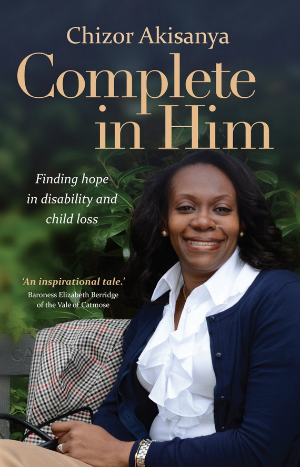Complete in Him
Chizor Akisanya was born at the start of the Biafran War – the Nigerian Civil War. Amid chaos and confusion and with a crumbling medical infrastructure she sustained severe damage to the nerves that control movement in her right arm.
As an adult she experienced the devastation of a miscarriage and shortly after a still-birth, having to endure labour with the awareness that the child in her womb was dead. In telling her story she allows herself to be openly vulnerable in the hope that it will inspire and encourage those struggling with life’s challenges
 I have discovered the liberating truth that in Christ I am complete just as I am. That awareness took me to a state of peaceful self-acceptance which birthed a desire to make the most of every moment and each new day.
I have discovered the liberating truth that in Christ I am complete just as I am. That awareness took me to a state of peaceful self-acceptance which birthed a desire to make the most of every moment and each new day.
In Complete in Him I speak of my journey in living with a disability, the everyday challenges that I encounter and the devastating loss of two babies.
I grew up with a disability in Nigeria, in a culture that stigmatised disability. I often wondered where the disabled people were and why they were not a part of mainstream society. I encountered very few in my day to day life, and never once saw a disabled professional or role model.
Disability and poverty, it seemed, went hand in hand. The largest group of disabled people were beggars who eked out a pitiful existence on the streets of the city. Congregating in public places and especially around major traffic hotspots, they swooped upon vehicles in the hope that their horrendous debilities would pierce calloused hearts, evoking pity and perhaps a few coins.
In their sorry, broken state they reflected society’s attitude towards disability. It was a scourge, a blight and the recurring picture of drivers and passengers who snapped their eyes away and looked pointedly ahead summed it all up.
Because disability was not spoken about, it was hidden away by families who felt ashamed. As a result they sought every means of escape from its grip. Healthcare was expensive and unattainable for many.
In contrast religion offered the promise of a miracle cure. Healing ministries began to thrive and whilst many were credible, sadly they also paved a path for some questionable individuals to exploit the desperation of the hopeless and helpless.
I was fortunate in having a secure and protected upbringing with parents who sought to shield me from the harsh realities of life. But I was challenged with issues of self-image and self-worth nonetheless, as I tried desperately to fit into a culture that seemed to promote physical perfection.
I also grew up in a state of conflict, struggling with my Christian belief and the teachings that I was exposed to which espoused the belief that God healed all sickness and infirmity subject to the person’s level of faith.
And then there was my desire to make the most of my life by maximising my present, notwithstanding its challenges. The two seemed on a collision course. I believed God’s word and did not doubt His ability to heal, indeed I had seen evidence of healing, but I rejected the need to go in pursuit of every person that promised a miracle healing.
I wanted to be healed, but I also wanted a focus beyond the all-consuming search for healing: I was more than a disability and I wanted to break away from the confines of a label.
After many years of hoping, praying and a singular focus on healing I have come to an interesting place. I believe wholeheartedly that God heals and I still hope and pray for healing but I seem to have stumbled upon something else, something that helped to bring perspective to my circumstances: perhaps there is a greater purpose to my disability than was immediately apparent. Perhaps God had another plan for me beyond just healing my arm.
These thoughts were the first steps on a journey of searching, of finding out about God first hand and not simply relying on the accounts and experiences of others. In my search I discovered certain truths that shored me up for life in an often confusing world: God loves me; there is a plan and purpose for every life regardless of our circumstances and each person has a valid contribution to make.
I found out that in the midst of life’s storms God is always present and He never once loses control. This turned out to be a huge comfort to me much later on during the dark days following the heartbreak of a miscarriage which was very quickly compounded by the devastation of a still-birth. Every adversity is an opportunity to know Him more intimately. It is at the times of my greatest weakness that I have experienced God’s love and strength in inexplicable ways.
I no longer hide my scars, instead I allow them to speak for me and point towards God in whom I have discovered a wholeness and complete acceptance. I want to live each day for the blessings that it brings, to enjoy the here and now, to savour the moment and perhaps in doing so I can bring some hope to those who struggle with challenging circumstances.
Chizor Akisanya is an ordained pastor, artist, speaker and mentor to women of varying ages. She is well on the way to becoming an advocate for people living with disabilities and is keen to raise awareness of disability issues within the church community. She practised law for several years and recently took on a senior management position at Jesus House London.
Complete in Him is published by Instant Apostle and is available from Christian bookshops and on-line retailers.
Baptist Times, 18/03/2016